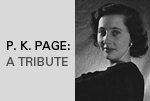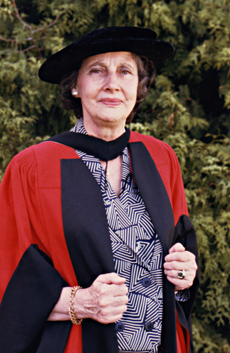Like all poets, P. K. Page believed in the value of small literary magazines. In August of 1944, when she was twenty-seven, she published some poems in Poetry, the Chicago magazine she had been desperate to get into. “At the time, it was the place to publish,” she said, “but as soon as they accepted my poems I felt like Groucho Marx: `I don't know if I care to belong to any club that would have me as a member.'” She looked to U. S. and U. K. magazines as venues for her work because there was very little literary activity in Canada—few magazines and publishers. The Massey Commission was seven years away from recommending that the country should support the arts financially, and the Canada Council wasn't even a twinkle in William Lyon Mackenzie King's eye.
She began writing when she was a child and published her first poems and stories in the newspaper produced by the private school she attended in Calgary. As a young woman in Montreal, she steeped herself in poetry, learning by reading and learning by writing. She recalled a day when she was so immersed in Rilke's Duino Elegies that she rode the streetcar miles past her stop and right to the end of the line. She met Patrick Anderson and Frank Scott, the founders of Preview, at a party, and before long she was part of their “Preview” group and was on the editorial board of the magazine. They gathered informally to drink wine and read their work to each other. It was the early 1940s. She fell in love with Frank Scott. He was seventeen years her senior and married and they had a relationship for three years until P. K. left Montreal and took with her the literary momentum that kept her writing until the end of her life. P. K. dedicated her last chapbook of poems, Cullen, to “F. R. S.”.
P. K. married Arthur Irwin as he was beginning his life as a diplomat and they spent a decade and a half in Australia, Brazil, and Mexico before Arthur left the service and they relocated to Victoria, B.C. in 1964. By then, CanLit was beginning to blossom. In Victoria, the literary community centered on Robin Skelton, a poet and critic who had come to Canada from England to teach at the University of Victoria in 1963. He founded The Malahat Review in 1967 with John Peter, a South African. On the west coast, P. K. found it difficult to adjust after her time in South America and, though she had won the Governor General's Award for poetry in 1954, she also felt that she wasn't entirely accepted into the writing community. Public readings of poetry had become fashionable, but P. K. felt slighted when she was not invited to gatherings and events.
She had started painting and drawing in Brazil and in Victoria she got to know the artist Pat Martin Bates. P. K. had a show at the Victoria Art Gallery. Gradually, she made friends and participated in the literary world too. She continued to write and to publish and organized readings at Open Space, an artist-run centre downtown. In 1977, Derk Wynand (who later became Malahat editor) invited her to teach a Creative Writing course at UVic and she accepted. The course was full of talented writers who would go on to achieve recognition for their work: Patricia Young, Gail Harris, Mark Anthony Jarman, Neile Graham, and Harold Rhenisch. But, according to Patricia, the students "were so closed-minded and convinced they already knew everything there was to know about poetry—oh the arrogance of youth—that P. K. refused to teach again." They didn't realize how lucky they were at the time, but eventually they figured it out.
I was loaned to P. K. Page in the spring of 1987 to sort and catalogue boxes full of dusty books in her basement. I had a student job at The Malahat Review and Constance Rooke, who was then editor, had become a close friend of hers. P. K. was looking for help and Connie guessed that a young Canadian Literature student and wannabe poet would jump at the chance to scrounge around in P. K.'s basement. She was right. I was thrilled.
After four hours in the dark one day, I was invited upstairs to have tea with P. K. and Arthur. Arthur had been editor of Maclean's and Commissioner of the National Film Board before his diplomatic service. I found myself, at twenty-one, sitting in the living room taking tea (which turned magically into gin after half an hour) and talking politics.
Arthur, who was eighty-nine then, had a disconcerting way of asking questions. He’d sit back in his chair and say things like “What do you think of Margaret Atwood?” or “What do you think of our local paper?” without betraying his own opinion in the slightest way until after I'd stumbled through my answer. He had been publisher of the local newspaper in the 1960s. I learned quickly with both Arthur and P. K. that the best approach was always to say exactly what I thought.
Constance Rooke left Victoria in 1988, but stayed on long distance as editor from her new position in Guelph, Ontario until 1992. P. K. was also friendly with subsequent editors—Derk Wynand, Marlene Cookshaw, and current editor, John Barton. Between 1978 and 2009, she appeared in 13 issues including both of the “West Coast Renaissance” issues (#45 and #50) under Skelton’s editorship. Malahat paid tribute to her with a special issue (#117, winter 1996) to celebrate her eightieth birthday. She contributed an interview to our special environmental issue: “The Green Imagination” (#170) and the Fall 2006 issue, featuring her artwork on the cover, was dedicated to her in honour of her ninetieth birthday. She also served on Malahat's editorial board from 1985 to 1992. In 2007, she donated funds to help create the P. K. Page Founders’ Award for Poetry. One of her last poems, “Cullen in Old Age” was published in Malahat in the summer of 2009. Another connection P. K. had with Malahat was her friendship with Lucy Bashford, Assistant Editor of the magazine from 1992 to 2004, whom P. K. hired as her administrative assistant. They worked together for over a decade.
One of P. K.'s most endearing traits was her curiosity. When she asked questions, it was because she genuinely wanted to know the answers. She was simply interested in all things and she took an interest in people. She was fifty years older than me, but we spoke as contemporaries. When she died, I talked to dozens of friends who felt a special bond with her, and the more people I talked to (people who often felt somewhat proprietary about her), the more I realized she made almost everyone feel like that simply by showing interest.
P. K. Page died early in the morning on January 14, 2010. She was 93 years old and had the good fortune to have been still residing at her home, thanks to her caregiver, Luisa. I was supposed to have lunch with P. K. the next day, as I did regularly on Fridays. I saw her often and in the last few years of her life I usually visited at her house because she was less mobile. She loved her parents deeply and thought she'd been lucky to be raised by them. She loved Arthur and missed him. In many ways, she didn't care about recognition, but she did care about respect. She wanted to be read, but she didn't feel a sense of entitlement. P. K. was truly honoured by her honorary degrees, and especially by her designation as a Companion of the Order of Canada.
In her last months, she said she was “losing her mind” because she knew she was having memory lapses. She wasn't afraid of death. Her good friend, Théa Gray, reported that P. K. had said, “I'm not afraid of death. I'm also not afraid of lions, although if one came into the room, I might change my mind.” I believed she was afraid of dementia—that someone who had spent so many years considering things deeply would hate to be aware that her mind wasn't working as well as it once had— but that wasn't it. On one of my last visits, she said that what she was afraid of was not being aware of death. She had had blackouts in which she appeared to be okay, but remembered nothing afterwards and she didn't want to die like that. She wanted to peer into the face of death. She wanted to study it with her eyes open.
Jay Ruzesky
December, 2010


 Jay Ruzesky
Jay Ruzesky


